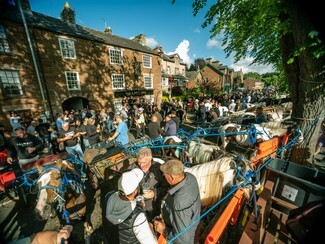Racism Without Consequence: How the UK Media and Institutions Continue to Demonise Gypsies and Travellers

In the UK today, racism against Gypsies, Roma, and Travellers (GRT) remains one of the last socially acceptable forms of prejudice. While other communities see support, progress, and protection from harmful stereotypes, the GRT population continues to be vilified—both blatantly and subtly—across mainstream media, public forums, and even police-run social media pages.
This is not simply about isolated comments or individual prejudice. This is systemic, deep-rooted, and actively harming lives.
Media Bias and Double Standards
The Daily Mail recently published a sensationalist article titled “Britain's traveller land-grabbing blitz revealed in new map.” It uses inflammatory language such as “illegal camps”, “land grabs”, and “invasions”, with no attempt to include a Traveller perspective or to address why so many families are forced to occupy land without permission in the first place. Councils routinely fail to meet their legal obligations to provide authorised sites, leaving families with no lawful place to stop.
In another example, Sky News covered the Appleby Horse Fair—Europe’s largest gathering of Gypsies and Travellers—not to celebrate its cultural significance, but to criticise the aftermath of the event. The headline focused solely on rubbish left in fields, completely ignoring the thousands who attended peacefully, the centuries-old heritage of the event, or the reality that all large festivals result in clean-up operations. There is little to no mention of the Gypsy and Traveller families who stayed behind to support Billy Welch in the clean-up of Appleby, or of the significant contributions they made to the effort. In June 2023 alone, Gypsies and Travellers raised £24,000 to help fund the clean-up operation.
Compare this to the coverage of Glastonbury or Notting Hill Carnival, where litter is never weaponised against the culture of the attendees.
The message is clear: when Gypsies and Travellers gather, it’s criminalised. When others do, it’s celebrated.
Police Silence on Online Hate
Even more disturbing is how official institutions allow racism to flourish unchecked. A recent example on a police-run Facebook page, operated by Thames Valley Police – West Berkshire, shows this clearly. The post referenced an incident involving a “group of Travellers,” and within hours, the comments section filled with hundreds of deeply offensive remarks.
These weren’t vague or coded. They included direct calls for violence, hate speech, and ethnic slurs—comments calling Travellers “scum,” “vermin,” and “animals” who should be “dealt with.” Dozens of users reported these posts. None were removed. No moderation. No public statement from the force.
This silence isn't passive—it’s permission.
If such hate were targeted at Jewish, Muslim, or Black communities, there would rightly be outrage. Why is hate toward Travellers treated differently? Why are public bodies allowed to host and ignore it?
A Long History of Racism, Still Alive Today
The racism experienced by Gypsies, Roma, and Travellers is not new—it is historical, systemic, and ongoing.
- The Battle of the Beanfield (1985) remains one of the most violent state-led actions against nomadic people in modern British history. Over 1,400 police officers ambushed a convoy of travellers heading to Stonehenge for the annual free festival. Vehicles were smashed, families assaulted, and over 500 people—including children and pregnant women—were violently detained. No officers were ever held accountable.
- “Beat a Pikey Day” is not an isolated phrase—it’s a pattern. Over the years, versions of this have surfaced in schools across the UK. It reflects how deeply anti-Gypsy racism is embedded, even among children—fuelled by negative media portrayals, casual adult prejudice, and societal neglect.
-in 2017, A police Facebook group was previously exposed for sharing racist slurs against Travellers. The group included comments like “I f[*cking hate P*keys,” and the initial investigation into these posts was deemed a “whitewash.” Only after public outcry did the Independent Police Complaints Commission (IPCC) mandate a reinvestigation.
- The 2021 Police, Crime, Sentencing and Courts Act introduced laws criminalising “unauthorised encampments,” effectively turning longstanding nomadic traditions into prosecutable acts. It gave police sweeping powers to fine, seize homes, and arrest families simply for stopping in unauthorised areas—despite a national shortage of legal sites.
- In November 2024, Greater Manchester Police forcibly dispersed Gypsy and Traveller families from the city center under a 48-hour order during the Christmas markets. Children - some as young as ten - were separated from their families and put on trains, with video footage showing them in distress. Witnesses reported racial slurs, physical force, and officers concealing badge numbers.
And yet, none of this sparks national soul-searching or curriculum change. While Britain reflects on past injustices toward other minority groups, GRT history is erased, denied, or ridiculed.
Why This Matters
When a whole community is painted as a problem, it’s easier to ignore their exclusion from healthcare, education, and housing. It becomes socially acceptable to deny them service, abuse their children in schools, or forcibly evict them without support.
If the UK is serious about tackling racism, then it must address the anti-Gypsy and anti-Traveller sentiment it continues to ignore. That includes holding media accountable for biased reporting, demanding moderation of online hate, and educating the public on the true history and contributions of the GRT communities.
Racism is racism—no matter who it's aimed at.
By Pearl Down
(Photograph: Appleby 2022 by Bela Varadi)